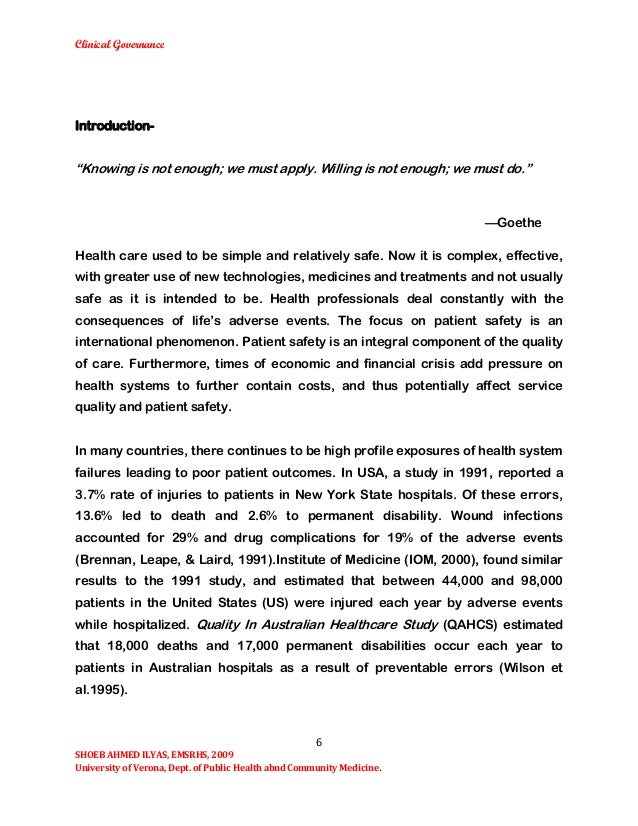Effective care
Clinical Governance was first introduced in the White Paper ‘The New NHS: Modern, dependable’ (DoH, ). Donaldson () viewed clinical governance as the vehicle to achieve, locally, continuous improvements in clinical quality, which will aid the government’s agenda for modernisation of the NHS The classic definition of Clinical Governance is “a framework which NHS organizations are accountable for continuously improving the quality of their services and safe guarding high standards of care by creating an environment in which excellence in clinical care will flourish” (Hill, ). Get Help With Your Nursing Essay · Clinical governance may be defined as ‘the framework through which healthcare organisations are accountable for continuously improving the quality of their services and safeguarding high quality of care’.1 Improving quality should be a core value of healthcare institutions worldwide; indeed, following the Health Care Act there is a statutory ‘duty of

Get professional help and free up your time for more important courses
· Clinical governance plays an important role in improving healthcare systems by enhancing and maintaining the continuity of the healthcare provided, creating an evidence-based framework for managing the healthcare provider, refining professional performance by providing scientific resources, and minimising the risk to the blogger.comted Reading Time: 4 mins Clinical governance can be broken down into seven different areas, traditionally known as the ‘seven pillars’, these are the seven aspects of clinical governance that clinicians are involved in. The seven pillars include; clinical effectiveness, clinical audit, risk management, education and training, patient and public involvement (PPI), use of information and IT, recruitment and staff Clinical governance is defined as a system set up to improve the standards of clinical practice (Finkelman ). As such, the system hopes that clinicians will go beyond their traditional role in health care provision and provide support to patients as they seek to improve the quality of care offered in health institutions

Clinical governance can be broken down into seven different areas, traditionally known as the ‘seven pillars’, these are the seven aspects of clinical governance that clinicians are involved in. The seven pillars include; clinical effectiveness, clinical audit, risk management, education and training, patient and public involvement (PPI), use of information and IT, recruitment and staff · According to Smith (), an effective and efficient clinical governance should embrace the following principles to achieve its objectives; Enabling administrative of clinical reviews, building different ideas to achieve a successful initiative, embedding a transformative partnership which will enable better outcomes for patients, each clinician to have a goal of The classic definition of Clinical Governance is “a framework which NHS organizations are accountable for continuously improving the quality of their services and safe guarding high standards of care by creating an environment in which excellence in clinical care will flourish” (Hill, ). Get Help With Your Nursing Essay

· According to Smith (), an effective and efficient clinical governance should embrace the following principles to achieve its objectives; Enabling administrative of clinical reviews, building different ideas to achieve a successful initiative, embedding a transformative partnership which will enable better outcomes for patients, each clinician to have a goal of The classic definition of Clinical Governance is “a framework which NHS organizations are accountable for continuously improving the quality of their services and safe guarding high standards of care by creating an environment in which excellence in clinical care will flourish” (Hill, ). Get Help With Your Nursing Essay Clinical governance is an integral part of integrated hospital governance which is defined as systems, processes and behaviours by which health service organisations lead, direct and control their functions in order to achieve organisational objectives, safety and quality of service and in which they relate to patients and carers, the wider community and partner organisations (DH

Clinical governance can be broken down into seven different areas, traditionally known as the ‘seven pillars’, these are the seven aspects of clinical governance that clinicians are involved in. The seven pillars include; clinical effectiveness, clinical audit, risk management, education and training, patient and public involvement (PPI), use of information and IT, recruitment and staff · According to Smith (), an effective and efficient clinical governance should embrace the following principles to achieve its objectives; Enabling administrative of clinical reviews, building different ideas to achieve a successful initiative, embedding a transformative partnership which will enable better outcomes for patients, each clinician to have a goal of Clinical Governance was first introduced in the White Paper ‘The New NHS: Modern, dependable’ (DoH, ). Donaldson () viewed clinical governance as the vehicle to achieve, locally, continuous improvements in clinical quality, which will aid the government’s agenda for modernisation of the NHS
No comments:
Post a Comment